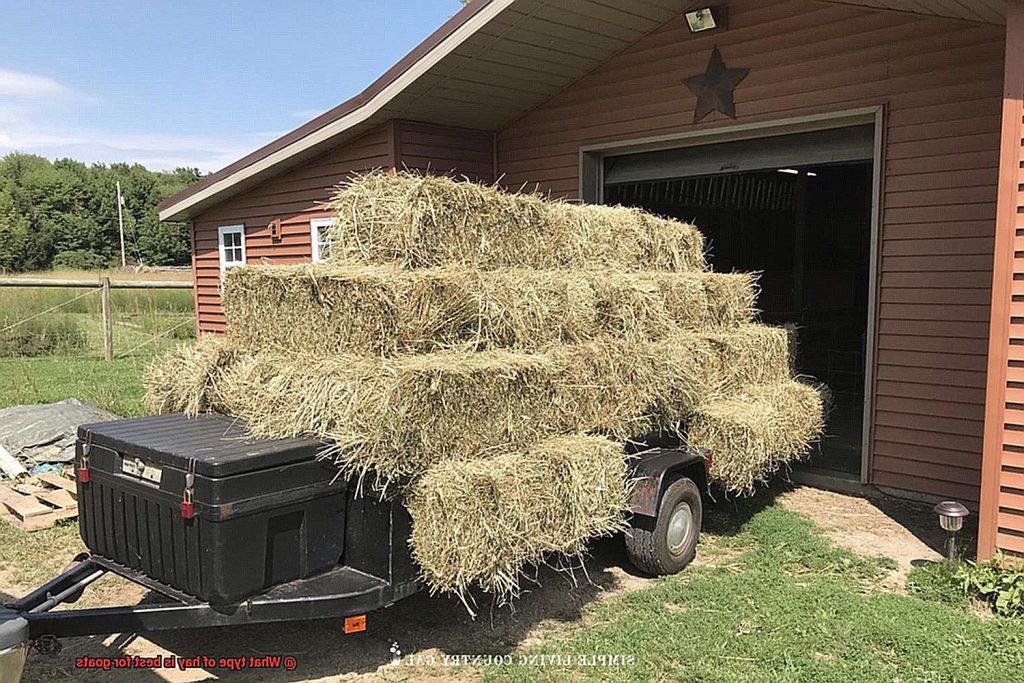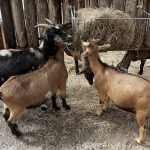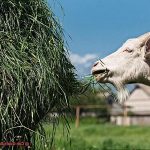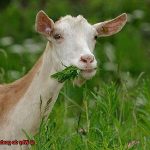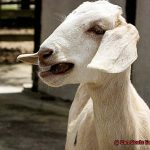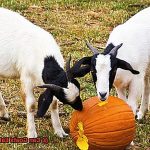Have you ever caught a goat chomping on dry leaves and wondered what’s up with their peculiar taste buds? As an animal behavior expert, I’m here to satisfy your curiosity and give you the inside scoop.
Goats are known for their insatiable appetites and their love for all sorts of forage, including grass, weeds, and even tree bark. But why do they have a particular fondness for dried leaves? Well, it all goes back to their evolutionary history and digestive system.
These nimble creatures are natural browsers who thrive on a diverse diet of plant material like leaves, shoots, and bushes. They evolved in harsh environments where food is scarce, so they learned to adapt by munching on dried leaves from trees and shrubs.
But that’s not all. Goats have a unique digestive system that allows them to extract maximum nutrients from their meals. Their rumen – the first compartment of their stomach – contains bacteria that can break down cellulose from plant material, including dry leaves. This means they can access the energy and nutrients stored in dried leaves that other animals would ignore.
So next time you spot a goat snacking on some crunchy foliage, you’ll know it’s just another day in the life of a savvy grazer taking advantage of its special digestive powers.
Nutritional Benefits of Dry Leaves
Contents
Among their varied diets, goats have a particular fondness for dry leaves, which may seem strange to some. However, this behavior is not only normal but also has several nutritional benefits.
One of the key reasons that goats love dry leaves is that they are an excellent source of essential nutrients. These leaves contain vital minerals such as calcium, phosphorus, and magnesium, as well as vitamins A, C, and E. These nutrients are vital for maintaining the overall health and well-being of goats. Moreover, the drying process removes excess water from the leaves, making them more concentrated in nutrients than fresh ones.
In addition to their nutritional value, dry leaves provide roughage that is vital for maintaining a healthy digestive system in goats. Roughage aids in stimulating the rumen and promoting healthy digestion by keeping the gut moving. Goats that do not get enough roughage in their diet are at risk of experiencing digestive issues such as bloating or constipation.
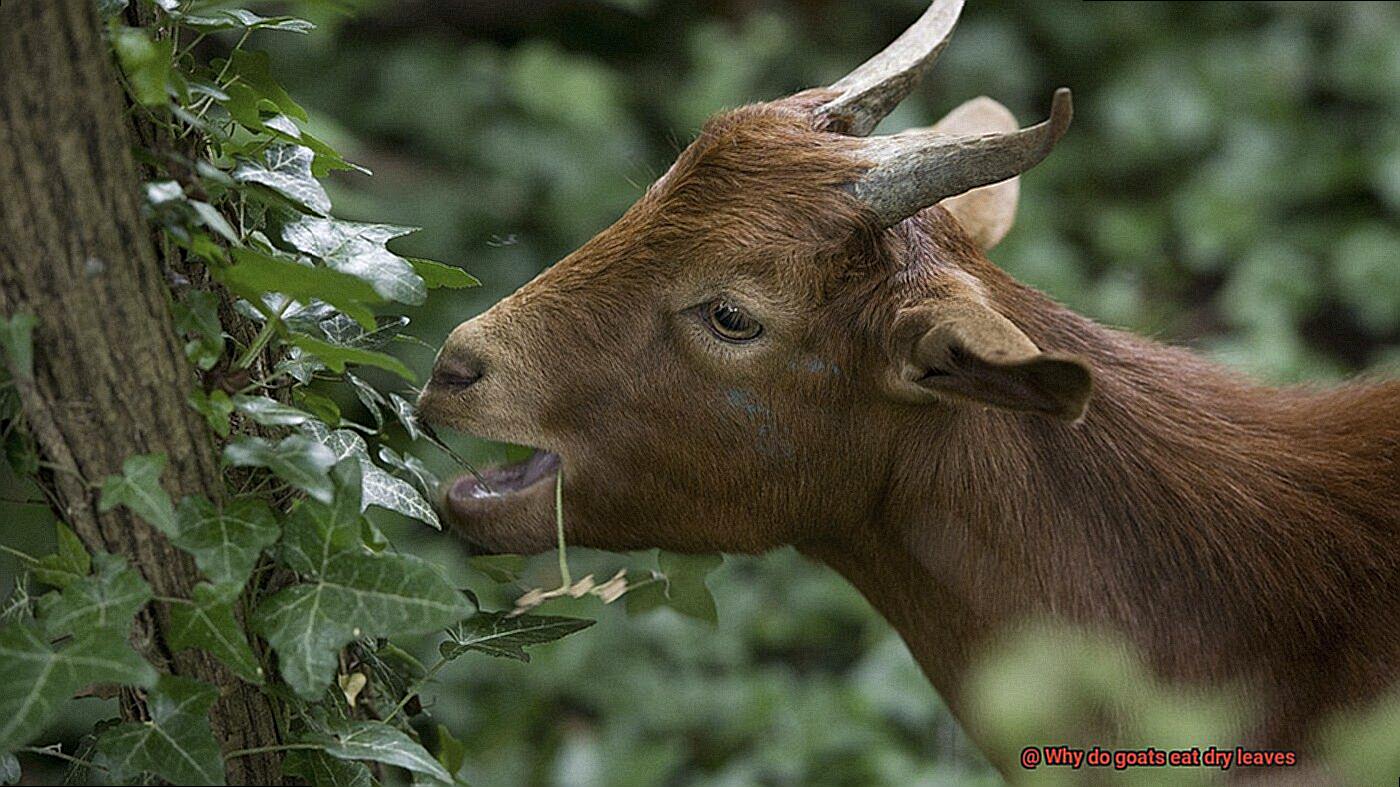
Furthermore, dry leaves are low in calories and high in fiber, making them an excellent option for overweight or obese goats. Fiber aids in proper digestion and helps prevent digestive problems like constipation. Additionally, certain types of dry leaves contain natural compounds that have medicinal properties for goats. For instance, neem leaves have antibacterial properties and can help prevent some infections in goats.
Roughage Value of Dry Leaves
You see, dry leaves contain high amounts of indigestible fiber that are essential to keeping a goat’s digestive system healthy and functioning well.
Roughage is a vital component of any ruminant’s diet, including goats. It promotes regular bowel movements and helps prevent constipation. Dry leaves are an excellent source of roughage because their four-chambered stomachs are specifically designed to break down tough plant materials. When goats consume dry leaves, the fermentation process begins in their stomachs, where bacteria and microorganisms work to break down the cellulose in the leaves and make them easier to digest.
The benefits of dry leaves don’t stop there. In addition to their high roughage value, dry leaves are also rich in essential minerals and nutrients that can help keep goats healthy. Vitamins A and C, calcium, potassium, and magnesium are just a few of the nutrients found in dry leaves that goats need to thrive.
However, it’s crucial to note that not all dry leaves are safe for goats to eat. Some types of leaves can be toxic, so it’s essential to know which ones are safe to feed your goats.
Taste and Texture of Dry Leaves
Although they may not be their top pick, goats have a knack for eating dry leaves when other food sources are scarce.
What makes goats unique is their ability to digest tough fibers found in dry leaves. While other animals may struggle with the rough texture, goats have adapted to extract nutrients from them effectively.
The taste of dry leaves can vary depending on the plant species. Some have a bitter flavor, which can be an acquired taste for goats. But like humans, goats develop a preference for certain types after repeated exposure. However, in general, goats prefer tender and succulent vegetation over dry leaves.
While dry leaves may not be the most nutritious food option for goats, they do have some value. For instance, they are high in fiber, which aids digestion and prevents constipation in these animals. They also contain essential minerals such as calcium, potassium, and magnesium.
The Impact of Diet on Goats’ Health
Although goats are known for their ability to eat almost anything, not all foods are suitable for their consumption.
One food item that goats commonly consume is dry leaves. While they may not be the most nutritious option, they are an excellent source of fiber which aids in maintaining healthy digestion and preventing digestive issues like bloating and constipation. Dry leaves also contain essential minerals and vitamins that goats need for optimal health. However, it is important to note that not all types of dry leaves are safe for goats to eat. Some leaves may be toxic or harmful, while others may not provide enough nutritional value. Therefore, it is advisable to seek guidance from a veterinarian or a goat nutrition expert to determine which types of dry leaves are safe and beneficial for your goats.
Aside from dry leaves, hay, fresh grass, grains, and other supplements should also be included in a goat’s diet as needed. The proportions and types of foods required will depend on factors such as the goat’s age, weight, and activity level. By providing a balanced diet that meets all of the goat’s nutritional needs, you can help ensure that they stay healthy and happy.
It is crucial to understand that an unbalanced or inadequate diet can lead to malnutrition, weight loss, and other health problems in goats. Thus, seeking advice from a veterinarian or a goat nutrition expert is highly recommended to determine the best diet plan for your goats.
What Other Foods Do Goats Eat?
They’re known for their indiscriminate eating habits and will happily munch on almost anything they come across. But what exactly do they eat?
Goats’ diets vary depending on their age and nutritional needs. Young goats or kids require more protein in their diets than adult goats do. They love nibbling on high-protein plants like clover or alfalfa. Some growing kids may also need specially formulated feed to support healthy development.
Adult goats, on the other hand, require more fiber in their diets to aid in digestion. They’ll often eat hay or browse on bushes and trees to obtain the necessary fiber. Interestingly, goats can eat weeds and shrubs that other animals might avoid, making them a great choice for landowners looking for a natural way to manage overgrown vegetation.
But it’s not just grass and hay that goats enjoy – they have a sweet tooth too. Fruits and veggies like apples, carrots, and bananas are also popular treats among goats.
While goats may be able to eat almost anything, it’s important to ensure that they have access to a balanced diet. A diet that is too high in protein can lead to kidney problems, while a diet that’s too low in fiber can cause digestive issues. It’s essential to provide fresh water at all times too.
How to Provide a Balanced Diet for Goats?
Goats are browsers, which means they prefer to graze on shrubs, bushes, and trees rather than grass. They also have a unique digestive system that allows them to process tough plant material, such as leaves and stems.
If you want to provide a balanced diet for your goats, follow these five subtopics:
Hay
The Backbone of a Goat’s Diet
Hay is the primary source of food for goats and should make up the majority of their diet. It provides the necessary fiber and roughage needed for healthy digestion. Good quality hay, such as alfalfa hay, is an excellent choice as it is high in protein and calcium. Make sure to provide enough hay for your goats to eat throughout the day.
Fresh Grass
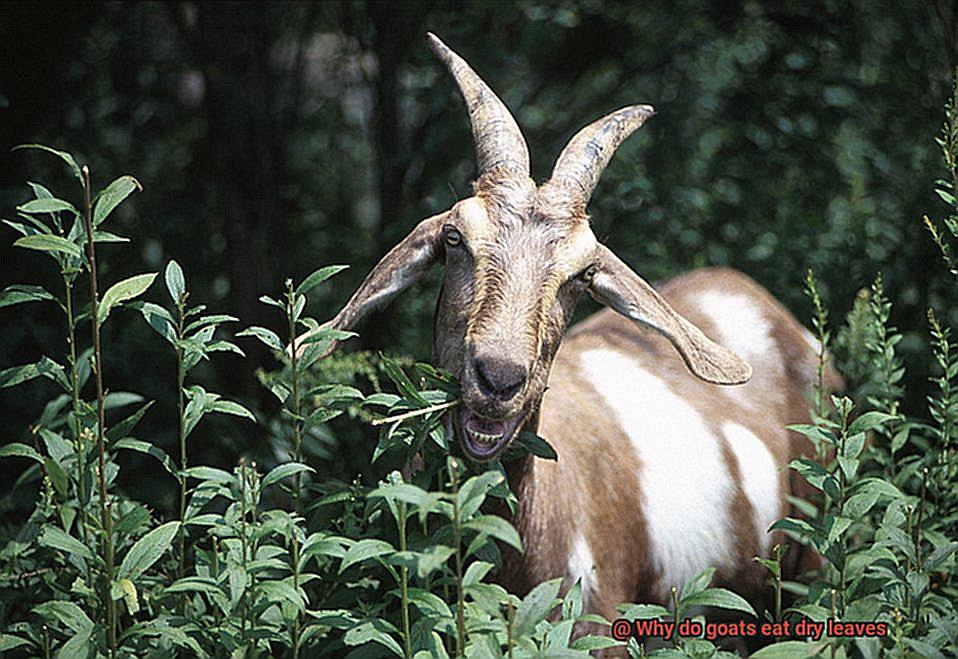
A Tasty and Nutritious Addition to a Goat’s Diet
Fresh grass is another essential part of a goat’s diet. Goats love to graze on grass, and it provides them with essential vitamins and minerals. However, it is important to ensure that the grass has not been sprayed with chemicals or fertilizers. Rotating pastures or browse areas regularly can also help prevent overgrazing.
Grains
A Supplement to a Goat’s Diet
Grains can be added to a goat’s diet but should be given in moderation. Too much grain can cause digestive problems and obesity in goats. A mixture of corn, oats, and barley is an excellent choice. You can also provide supplements that meet their nutritional needs.
Vegetables
A Healthy Treat for Goats
Vegetables such as carrots, beets, and squash can be given as treats to goats. They are a great source of vitamins and minerals and can help keep goats healthy. However, make sure not to overfeed them with too many treats.
Water
Clean water should be provided at all times to ensure that goats stay hydrated and maintain healthy digestion. Ensure that the water source is clean and easily accessible for the goats.
Remember to monitor your goats’ body condition scores regularly. Overfeeding can lead to obesity and health issues, while underfeeding can result in malnourishment and stunted growth. Adjust their diet accordingly to maintain optimal health.
wfgrOa5eBd8″ >
Conclusion
In conclusion, goats have a unique palate and are natural foragers who thrive on a diverse diet of leaves, shoots, and bushes. While some may find it odd that they have a particular fondness for dry leaves, it is actually normal behavior that has several nutritional benefits.
Dry leaves contain high amounts of indigestible fiber that are crucial to keeping a goat’s digestive system healthy and functioning well. This roughage promotes regular bowel movements and prevents constipation – something we can all appreciate. Additionally, dry leaves also contain essential minerals and vitamins that goats need for optimal health.
However, not all types of dry leaves are safe for goats to eat. Some may be toxic or harmful while others may not provide enough nutritional value. It is essential to seek guidance from a veterinarian or goat nutrition expert to determine which types of dry leaves are safe and beneficial for your furry friends.
To ensure your goats stay healthy and happy, it is important to provide them with a balanced diet that meets their nutritional needs. Hay should make up the majority of their diet as it provides the necessary fiber and roughage needed for healthy digestion. Fresh grass is another vital part of their diet as it provides them with essential vitamins and minerals. You can also add grains in moderation while vegetables can be given as treats.
By monitoring their body condition scores regularly and adjusting their diet accordingly, you can help ensure your goats maintain optimal health.

